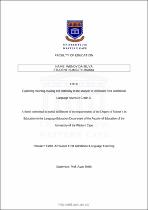Exploring meaning-making and criticality in the analysis of Afrikaans First Additional Language novels in Grade 11
Abstract
Guided by Cultural Historical Activity Theory and Socio-cultural Theory, this research
explored meaning-making and criticality in Grade 11 classrooms in respect of their analysis of
the prescribed Afrikaans First Additional Language novel Die kruppel engel (The cripple
angel) at two Western Cape schools. Studies have shown the importance of literature in
education, particularly the impact it has on learners and how it develops them in terms of
broadening their thinking, increasing their vocabulary, and improving their reading (Fialho,
Zyngier, & Miall, D, 2011). However, little has been mentioned about the complexities of the
content analysis on learners and the learning process. This study aims to specifically examine
and understand the teaching and learning of meaning-making and criticality of multilingual
Grade 11 learners and teachers when analysing novels in the classroom.
This study used a qualitative case study approach, and the researcher collected various data
sources, which included teacher interviews, lesson observations and learner focus group
discussions. Through these sources, the study found that prescribed novels that explore
contentious themes are beneficial for learning, the enjoyment of novels enhances learning,
multilingual practices help learners in their meaning-making process, and multimedia both
positively and negatively influences novel literature reading.
The results of this study may offer the Department of Basic Education and teachers some
insight into the use of prescribed novels in schools.

